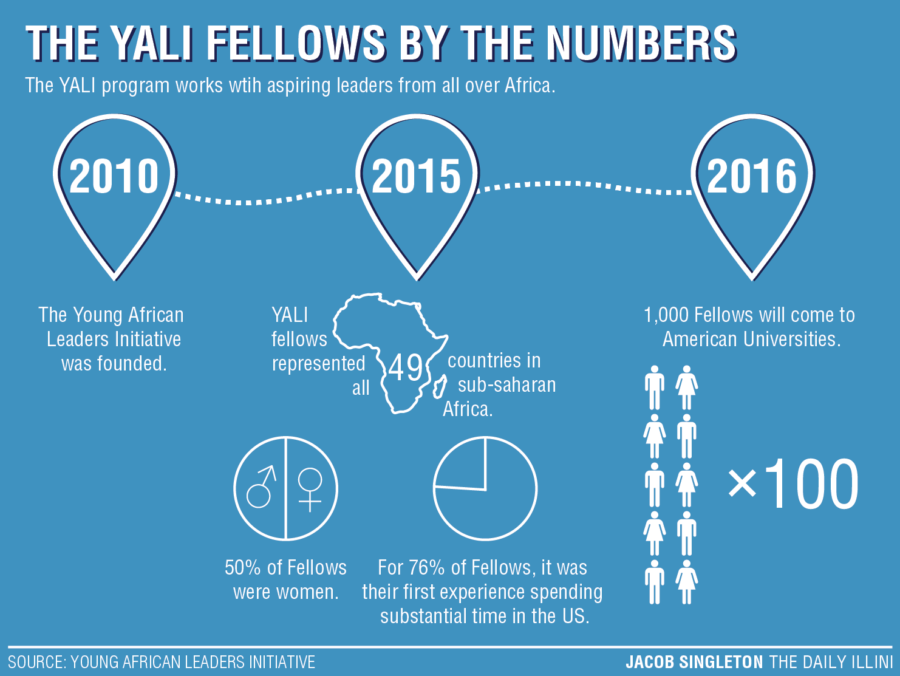University hosting Obama's Young African Leaders Initiative in summer
Feb 24, 2016
Last updated on May 5, 2016 at 04:53 p.m.
Fifty young professionals will be making a big jump from their homes in African countries to the University of Illinois, in efforts to learn about characteristics of democracy to bring back to their communities.
President Barack Obama’s Young African Leaders Initiative is part of a flagship program, working as part of the Mandela Washington Fellowship for Young African Leaders. There will be two different institute programs held at the University: the Civic Engagement program and the Public Management program.
Get The Daily Illini in your inbox!
“It’s a validation of the quality of our University that among all of the thousands of universities in the country, that U of I was chosen,” said Dan Shalmon, Engagement Coordinator of the Cline Center for Democracy. “It really reflects not just excellence in one lab or one department. It’s a reflection of the strength of the University as a whole.”
The six-week program, starting on June 17, will enable the “young fellows” to engage in a variety of activities and will offer seminars, workshops, trips to Springfield, Chicago and more.
“This is a professional training program for young Africans, aged 25-35 or so, to create leaders who would move their nations,” said Jeffrey Friedman, program manager at the Center for African Studies. “Not only economically, but in terms of technology development, as well as fostering democratic institutions. We’re not talking about changing governments, but fomenting a kind of democratic atmosphere in the society.”
In addition to the academia-focused aspect of the program, the fellows will also engage in a number of community service and hands-on activities, which helps the program meet its objective of fostering a sense of civic engagement and civic leadership.
Besides involving some of their faculty to lead certain sessions throughout the course of the program, the Cline Center for Democracy is an education and research organization with a mission stating that their goal is aimed at transforming information into knowledge that advances human progress.
“We aim to transform this world of billions of documents, speeches, and news articles into structured data that can be used to address serious social and political problems,” Shalmon said. “We are hoping that some of these (fellows) will make use of our data, and ask us important questions about it. Maybe (they will) give us some insights that we hadn’t generated ourselves, and perhaps they’ll make use of some of our research as they move forward with their projects.”
With resources, ranging from faculty to data to workshops, at their disposal, the young fellows will be able to bring back what they’ve learned to their communities and apply the newfound knowledge in their fields of professional study. The program will focus on topics including citizenship, community building, grass-roots activism and economic development.
“They’re going to have an overview of how we as American citizens have helped to shape our history and our government, not just as individuals but as a group,” said Merle Bowen, professor of African American studies and co-director of the program. “They’re going to be learning what leadership means. How to examine it in a country like the United States. How to build these types of skills regarding citizenship, community building, use of technology, and advancing civic causes.”
The fellows aren’t the only ones to benefit from the program. Graduate students at the University will have a chance to work alongside the fellows within similar areas of study. The program is also aiming to foster an environment where faculty, students and the fellows can exchange new ideas and perspectives and collaborate.
“The power of bringing these folks here, when they’re young and they’re in the process of making decisions about their values and their goals over the course of their careers, can really have a significant influence,” Shalmon said. “Having a positive, shaping influence on the way that young people in a continent in transition understand their values, their potential to do good in their societies, that’s important.”






